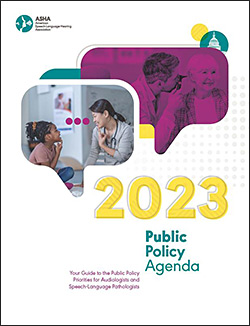2023 ASHA Public Policy Agenda
The 2023 Public Policy Agenda (PPA) establishes a number of priorities aimed at ensuring that the value of the professions in school, health care, early intervention, private practice, and higher education settings is adequately reflected in rapidly evolving laws, regulations, and payment policies. The PPA reflects ASHA’s ongoing commitment to patients, clients, and students; evidence-based practice and outcomes; public health; the highest standards of professional ethics; a diverse professional workforce, equitable and inclusive policies and practices, and nondiscrimination on the basis of the full range of diversity, including but not limited to ability, age, ethnicity, gender identity or expression, national origin, race, religion, sex, sexual orientation, socioeconomic status, and/or veteran status.
ASHA looks forward to working collaboratively with lawmakers, policymakers, decision makers, and allied stakeholders to advance the public policy priorities in the 2023 Public Policy Agenda.
Health Care Priorities
- Advocate for comprehensive access to, coverage of, and equitable payment for audiology and speech-language pathology services, including early intervention services.
- Advocate for expanded and permanent coverage of services provided by means of telepractice—including, but not limited to, pay parity and policies that explicitly incorporate the full scope of practice of audiology and speech-language pathology.
- Advocate for maintaining the critical role of SLPs in skilled nursing facilities as well as productivity standards that support clinical excellence, ethical practice, and high-quality service delivery.
- Advocate for the inclusion and successful participation of audiologists and SLPs in value-based care, alternative payment models, and other emerging health care delivery systems.
- Advocate for federal funding and policies through the fiscal year 2023 appropriations process that support the identification, assessment, treatment, and management of speech, language, feeding/swallowing, cognitive, hearing, and balance disorders.
Schools Priorities
- Advocate for the establishment of a dedicated Technical Assistance Center on communication disorders in the U.S. Department of Education.
- Advocate for state-based incentives, such as salary supplements, that are designed to support a robust workforce.
- Advocate for initiatives that expand technology capacity to support the provision of services to students via telepractice.
- Advocate for the inclusion of educational audiologists and school-based SLPs as peer reviewers for the U.S. Department of Education.
- Advocate for federal funding and policies through the fiscal year 2023 appropriations process that support the identification, assessment, treatment, and management of speech, language, feeding/swallowing, cognitive, hearing, and balance disorders.
Professional Practice and Workforce Priorities
- Advocate for the successful operationalization and further adoption of the Audiology and Speech-Language Pathology Interstate Compact.
- Advocate for licensure and certification standards, which (a) ensure that audiology and speech-language pathology services are provided by individuals with appropriate academic and clinical training as well as (b) support the ability of audiologists and SLPs to practice to the fullest extent of their education and training.
- Advocate for public policies that support appropriate and safe working environments.
- Advocate for public policies that align with the standards of ASHA’s Assistants Certification Program—including, but not limited to, appropriate credentials, roles and responsibilities, and supervision standards.
Client, Patient, and Student Priorities
- Educate policymakers and payers on (a) the utilization and implementation of over-the-counter (OTC) hearing aids and (b) the impact that OTCs are having on constituents and consumers with perceived mild-to-moderate hearing loss and on the provision of hearing health care services.
- Advocate for the continued ability of clients, patients, students, caregivers, audiologists, and SLPs to make informed early intervention and treatment decisions with equitable access to objective and evidence-based resources.
- Advocate for the completion of a Government Accountability Office (GAO) study authorized by Congress on disparities in newborn hearing screening follow-up services.
- Advocate for state compliance with screening and hearing service mandates under Medicaid’s Early and Periodic Screening, Diagnostic and Treatment benefit.
- Advocate for greater beneficiary choice when using hearing device benefits offered by Medicare Advantage plans.
Diversity, Equity, and Inclusion Priorities
- Advocate for or engage in anti-discriminatory policies and practices that support audiologists, SLPs, and people with communication disorders in areas that include ability, age, ethnicity, gender identity or expression, national origin, race, religion, sex, sexual orientation, socioeconomic status, and/or veteran status.
- Advocate for a diverse population of undergraduate and graduate students in accredited speech, language, and hearing science programs.
- Advocate to policymakers for greater awareness of different linguistic systems, the impact of language and dialects on the provision of services, and the role of audiologists and SLPs in promoting a culturally responsive workforce.
- Advocate for greater coverage of services by highlighting the impact that social determinants of health have on people with communication disorders.
Resources for Getting Involved
Providing dynamic and convenient opportunities for ASHA members to advocate is critical to ASHA’s overall success! As a member of ASHA, your voice is incredibly valuable. The professional perspectives and personal narratives that you bring to a public policy issue have a powerful impact. By working together, we can most effectively educate, inform, and persuade lawmakers, policymakers, and other decision makers to take actions that benefit the professions as well as the patients, clients, and students whom we serve.
You can become informed and involved in a number of ways. Becoming an effective advocate is easy and takes very little time!
- Follow ASHA Advocacy on Facebook and Twitter.
- Sign up for ASHA Headlines to receive the ASHA Advocate.
- Take action on ASHA’s advocacy issues by contacting your elected officials.
- Become an ASHA Grasstops Envoy.
- Learn about ASHA-PAC.












